A couple of weeks ago, we let you know that my application for permission for a Judicial Review into HS2 issuing ‘Notice to Proceed’ was refused, but what we didn’t expand on was what it was all about. As nothing has changed and it still seems pretty clear that Ministers, Civil Servants and HS2 Ltd employees committed Fraud by Abuse of Position along with a few other things, it’s only right to put some of the issues on the record, especially as many of them have never been reported before,
First off, it’s worth explaining what ‘Notice to Proceed’ actually was. Originally when the HS2 Act for phase one passed into law in 2017, there was a Development Agreement, and it said there were meant to be three Review Points which HS2 Ltd would only pass if they demonstrated that their management was competent, that the budget was under control and all of that sort of stuff. When they passed each Review Point, this would meant they would get more powers to do work and let contracts, and finally when they passed Review Point 3 HS2 Ltd would be allowed to issue ‘Notice to Proceed’, meaning civil engineering construction could begin and we’d all be stuck with this ridiculous white elephant, or at least there would be no way out of paying the cost of those construction contracts.
But what actually happened was that in 2015 HS2 Ltd failed Review Point 1. They then failed Review Point 1 again, but ignoring those pesky issues of competence and probity, the then Chancellor George Osborne MP went off the China and launched the tendering process anyway, even though that absolutely wasn’t meant to happen until HS2 Ltd had passed Review Point 1. Oh, and then in 2016, they failed Review Point 1 again, but then Secretary of State for Transport Patrick McLoughlin didn’t really care. HS2 Ltd then got to the stage where they wanted to sign the first part of those design and build contracts, but of course to do that, they were meant to have to passed Review Point 2. The Government realised that there was absolutely no chance whatsoever of that happening, so they amended the HS2 Development Agreement to cut down the 122 mentions of the phrase ‘Review Point’ to a big fat zero. Yes that’s right, they knew HS2 Ltd couldn’t display the necessary competence and probity that Parliament had expected, so they just decided that HS2 Ltd didn’t have to.
While Review Point 3 was scrapped, ‘Notice to Proceed’ was still the final yes/no for the project, with HS2 Ltd Chairman Allan Cook confirming that to pass NtP, HS2 Ltd would have to demonstrate: the robustness of a revised business case; management capability; and affordability of contracts. He stated that getting Notice to Proceed would mean “That we can actually then let the contracts for the main construction works that need to go on in phase 1. Getting approval for the notice to proceed means that we can let contracts with our main suppliers, to ensure that we deliver the programme against the schedule we are committed to.”
If you’ve never seen the infamous appearance of HS2 Ltd chairman Allan Cook at the Transport Select Committee, when even chief parliamentary HS2 apologist Lilian Greenwood MP seemed to lose patience, I strongly recommend you do. It’s actually quite scary, but when you see the sheer level of incompetence there has been right at the top, you can understand why things are quite so bad as they are.
Cooks view on NtP was also backed up by Doug Oakervee, the man who Boris Johnson brought in to conduct a supposedly ‘independent’ review on HS2 in 2019. His report recommended that HS2 should go ahead, but very specifically said that this was not the final decision and that “Notice to Proceed is in essence a go/no-go for the entire project.”
But remarkably, months after his report had concluded that HS2 should go ahead because it was this great and necessary project with fantastic benefits and all that sort of stuff, he torched the whole thing and revealed his real reasons for saying it should go ahead, saying:
“We gave the Prime Minister our thoughts and said the whole of HS2 should proceed, but it was largely driven the Southern section and actually to get that started as Notice to Proceed was due. That was really driven by 4 factors: £9billion had been already spent and the opportunity to recover any of that was minimal; the land and properties and communities along the line had been blighted for many years; and the construction industry was in a very fragile position and had it been cancelled it would have done tremendous harm to the supply chain across the whole of the UK and the construction industry in general; also the West Coast Mainline between London and Rugby was operating beyond capacity and hindering a reasonable service and a timely service for passenger and freight to the North.”
So he basically admitted that the reasons he had for going ahead for HS2 were actually:
- £9bn has already been wasted on the thing, so it would make sense to waste at least another £90bn on it.
- Planning of HS2 has caused 10 years of blight and the preparation works are causing a right old mess, so obviously going ahead with even more irreversible devastation and having HS2 actually built will somehow make that problem better for people along the route, opposed to cancelling the whole thing and ending the nightmare for everyone.
- The construction industry, who have been responsible for the lobbying that has got HS2 this far, will fall over if they don’t get their white elephant.
- The West Coast Mainline is full and there is no room for any more trains, ignoring the the fact that the new franchisee says they can add 263 services per week. That’s two an hour on this ‘full’ line, without improvements such as in-cab signalling and addressing the remaining pinchpoints, just by changing the timetable.
The first point illustrates what we had been saying had been the plan from HS2 Ltd for a very long while; to spend as much money as quickly as possible to try and make the thing impossible to cancel.
Which brings us on to the issue of fraud, and I’m in no doubt that HS2 has been a fraud from the start. And I do mean fraud in the legal sense of the word, as when you look at Section 4 of the 2006 Fraud Act, it’s difficult to see how you could class what has gone on as not being fraud by abuse of position.

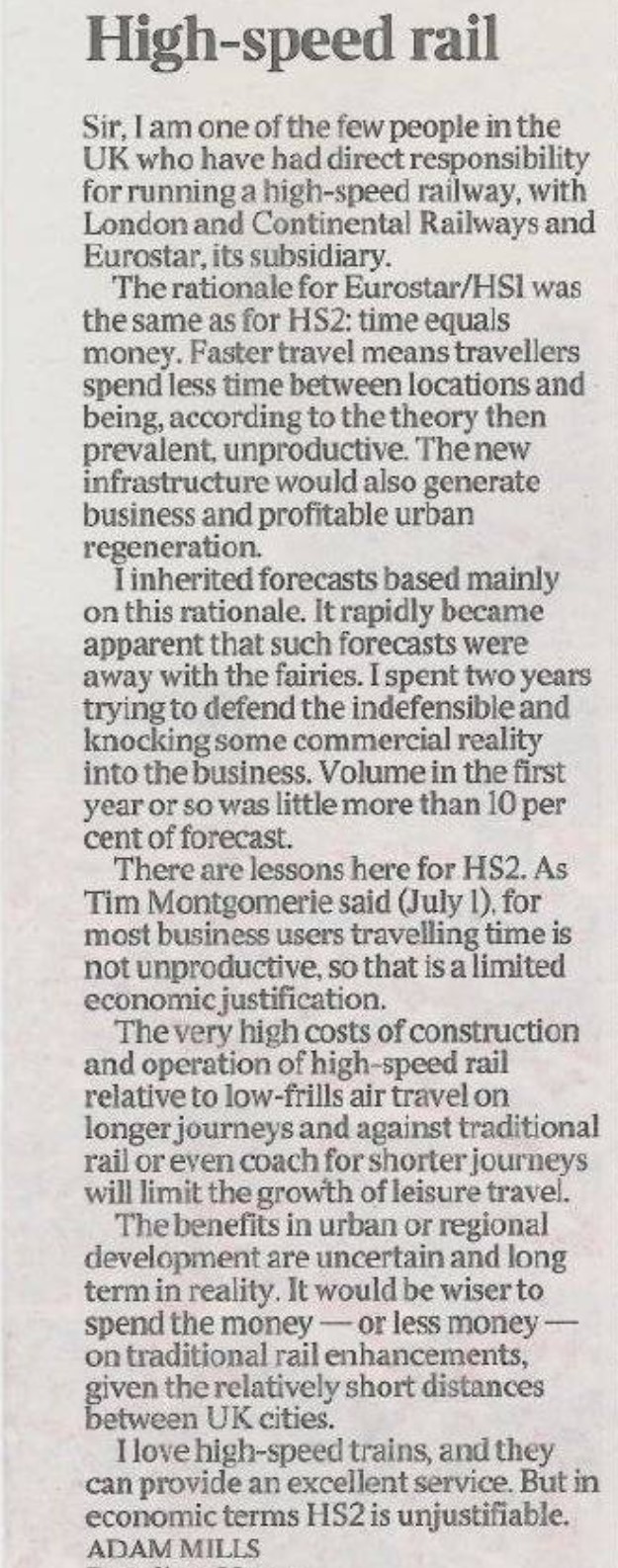 Initially to achieve approval, and since then to maintain support, the HS2 project has had to demonstrate that it had a positive business case, that the economic benefits would be large enough outweigh the massive costs.
Initially to achieve approval, and since then to maintain support, the HS2 project has had to demonstrate that it had a positive business case, that the economic benefits would be large enough outweigh the massive costs.
To do that, the bulk of those economic benefits in successive HS2 business cases comes from demonstrating ‘user benefits’, which are founded on lies and a multiplier effect is used to take something that plainly is not true and turn it into tens of billions of pounds of economic benefit.
While you might think the phrase “Time is Money” is just a maxim, as far as HS2 Ltd are concerned it is a quantifiable fact.
The starting point takes a couple of completely false premises and states them as solid facts: first that no-one ever does any work whilst travelling on a train and therefore all time on trains is wasted; and that anyone who is told that their “business journey” will be shorter won’t chose to stay in bed for an extra half hour, or get home earlier in the evenings to see their families. No, these people will choose to do work in this theoretically saved and otherwise unproductive time.
Add these two counterfacts together and all this saved journey time becomes productive time which can be financially quantified counted as increased economic output. What you do is take all that time that has been saved (absolutely ignoring the fact many HS2 stations aren’t were existing train stations are, so people will lose some of that time as they take longer to connect to ongoing rail journeys), multiply the time saved by a completely fictious passenger forecast, multiply it again by an average hourly wage that proves HS2 is intended to be a “Fast Train for Fat Cats”® and hey presto, you have tens of billions of pounds of economic benefit, and a positive business case for building HS2.
This is something that the former chair of HS1 Adam Mills described as “Away with the fairies”.
Just as bad, and as HS2 Ltd knew right from the start, the number of trains they were saying they could provide – a key factor in how much time=money could be saved – was not achieved anywhere in the world at the proposed speeds.
Basically, they were relying on technology that was not yet invented in 2010. In 2021, it still hasn’t been invented. Even the Oakervee Report said HS2 could not provide the services they were promising, saying: “HS2 Ltd and the DfT should seriously look at reducing the specifications of HS2 Phase One. This should include reducing the central planning assumption for HS2 to a more realistic 14 trains per hour (tph), while future proofing the scheme for 16tph, and noting the loss of assumed benefits.”
But of far more concern were the ridiculous passenger forecasts that HS2 were coming up with. Even after 11 years, they still predict they will carry about 300,000 passengers per day. To put that into context, that is more passengers than all the long-distance services on West Coast, East Coast and Midland Mainlines put together, prior to the 2020 pandemic of course. Not only that, but HS2 would serve far fewer routes than those lines, high speed means few stations, so only about 50-60,000 of the current passenger journeys could be replaced by HS2, about a fifth of the passengers they say they’ll have. This has massive implications on the equally fraudulent carbon case for HS2, but in terms of the money HS2 will be like pretty much every other high speed railway in the world, it will never get anywhere near the grossly inflated passenger forecasts used to justify its construction.
You also see these absurd claims about the benefits of ‘freed up capacity’ – the trains that could run if HS2 could mean the cancellation of those current inter-city trains that stop at places that HS2 won’t. But even now after 11 years, Freedom of Information Request responses show that they still haven’t done the work to assess what ‘freed up capacity‘ could mean, it’s just a phrase that is used by snake oil fraudsters trying to convince the gullible as to the worth of their boondoggle.
There has also been a long and proud history of Government refusing to publish any information which is critical of HS2. In 2013 Patrick McLoughlin and Francis Maude told David Cameron he should use a veto, previously used to block publication of documents relating to the Iraq War, because the report in question would cause “Presentational Difficulties” for HS2. When that report was finally published after a three year delay, it stated “The Department [for Transport] cannot judge with a high degree confidence that the delivery of the London to West Midlands project is affordable.” This was just the first of a consistent parade of official Government reports which said HS2 was failing, and in the end it got the point where Government would respond to a report that said HS2 was failing by saying things like “HS2 is in excellent shape” . Future excuses for refusing to publish information included old favourites like “We do not hold the information” and the liberal use of Non-Disclosure Agremeents, with it being a long old slog to get many documents published at tribunal. My favourite has to be that they still won’t release the review by Sir Jeremy Heywood into HS2, because it relates to Government policy still being developed. Heywood died in 2018.
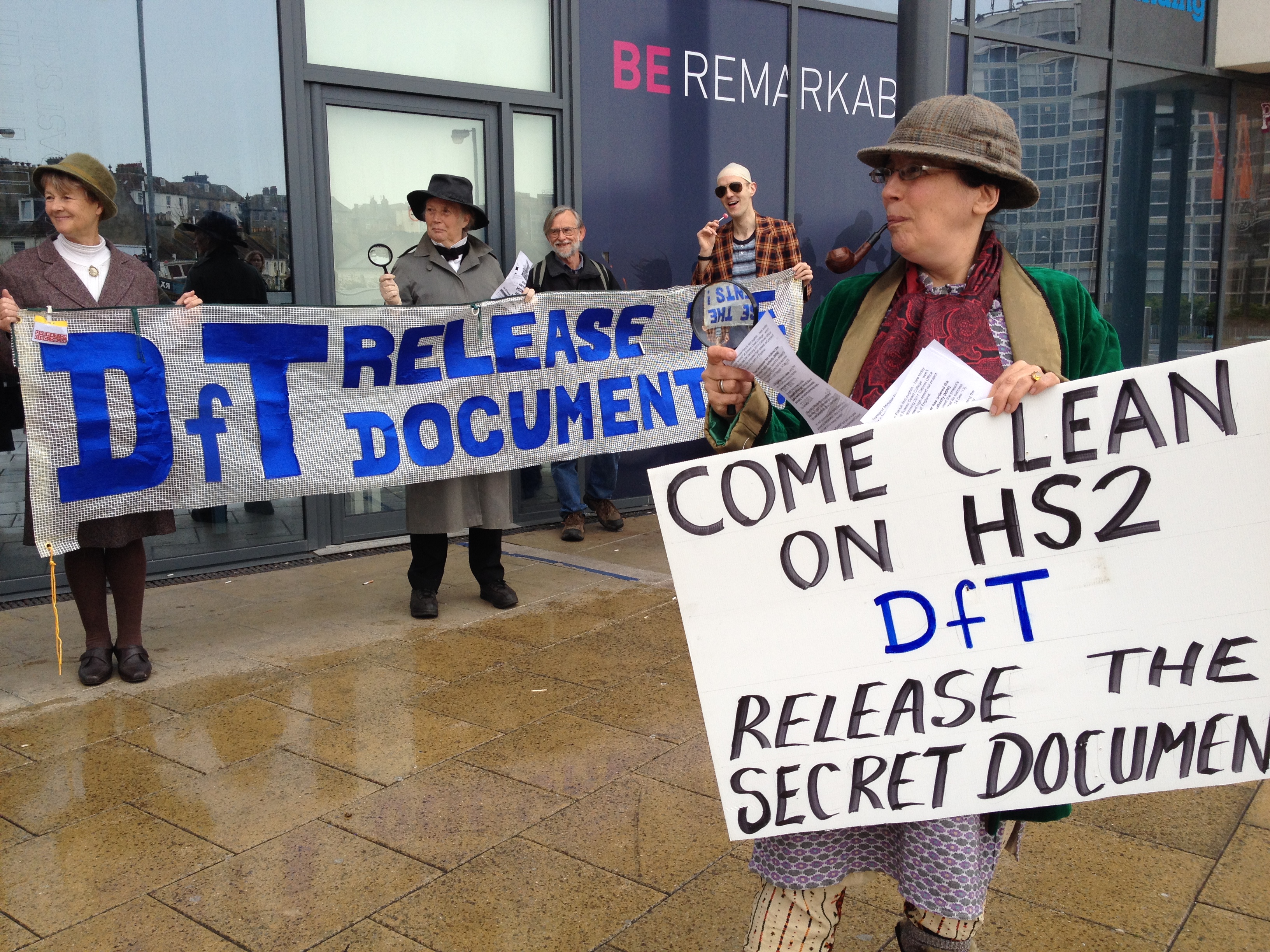
A collection of the worlds greatest detectives couldn’t find those secret HS2 documents. Photo: Coombe Haven Defenders
Naturally, when next Transport Secretary Chris Failing Grayling (remember him!?) updated that infamous HS2 Development Agreement on 17th July 2017, a time when he would tour media studios saying that “HS2 is on time and on budget and I expect it to stay that way”, he redacted both the ‘Baseline delivery schedule for Phase One’, and the ‘Baseline cost model for Phase One’ in their entirety from that document. As someone said at the time:
“If Chris Grayling is so adamant that ‘HS2 is on time and on budget’, then why has he decided to make every piece of information about the actual timescales and actual budget a state secret? It seems remarkably convenient that the one public document which could verify that Mr Grayling is telling the truth has been redacted, by Mr Grayling himself. If HS2 is ‘on time and on budget’ as he claims, what has he got to hide?”
Now while these are the foundations of fraud by abuse of position, as was the clearly entryist* original cost estimate for HS2 of £33bn (*a cost estimate which was made up to be just about low enough for idiot politicians to accept), as are the accusations from whistleblowing former HS2 Ltd staff members (whether HS2 Ltd attempted to pay them off or not), these issues are not the sort of thing that you can absolutely demonstrate without fear of contradiction as being fraud. Even the time when HS2 Ltd ‘found’ £9bn in savings to perfectly match a £9bn cost overrun might stink like hell, but it’s not proof.
However, what does seem to be evident fraud is when various politicians, civil servants and HS2 Ltd staff kept repeating the mantra that HS2 was “on time and on budget”, despite the fact they categorically knew that it wasn’t. In doing that, they would deliberately mislead parliament in breach of the Ministerial and Civil Service Codes, as well as breaking the Companies Act, all under the overarching banner of Section 4 of the 2006 Fraud Act.

The problem is, no-one seems to care about these things, like the letter from Patrick McLoughlin to George Osborne in 2016 admitting that HS2 was late and over budget. This was before Phase 1 had got through Parliament, yet Parliament was never told before it got Royal Assent, and that letter didn’t become public until 2019.
In the same way, the National Audit Office report “High Speed Two: A progress update” published in January 2020 revealed that in October 2018, HS2 Ltd’s contractors estimated that main civil construction costs were 83% above the target price, and that HS2 Ltd had formally notified the Department for Transport that there were “significant challenges to the affordability of the programme”. Yet in an interview for Panorama, broadcast on December the 18th 2018, HS2 Ltd CEO Mark Thurston had stated categorically that HS2 was on time & on budget.
In the same vein, the 2018-19 Annual Report of HS2 Ltd was signed off by both Chairman Allan Cook & Thurston, with no mention of what were accepted cost escalations and delays, even though the Companies Act 2006, (Strategic Report and Directors’ Report) Regulations 2013 specifically states that the strategic report must contain:
- a fair review of the company’s business, and
- a description of the principal risks and uncertainties facing the company.
This does suggest that there was a legal requirement to report the known delays and cost over-runs in that report, but for Cook and Thurston, supposed guardians of public money, they clearly didn’t think this wasn’t the case.
Of course, it’s worse than that, because when that Annual Report was ordered by Parliament to be printed (which surely adds an extra layer of expected probity?) on 18th July 2019, they actually knew how bad things were. The 2020 National Audit Office report (See Figure 6, pages 26-28) gives some indications of what happened when , but a surprisingly answered Freedom of Information Act Request has revealed that in March 2019 there was a meeting with ministers where Allan Cook informed them:
“The HS2 Ltd board had been told by the executive that the latest point estimate for phase 1 was approximately £28bn, with a £6-7 billion gap in the forecast, and a 2-3 year change to the schedule.”
Besides the personally hilarious fact that HS2 Ltd had told the Sunday Telegraph that I was “wrong and Misleading” for saying that HS2 was evidently about 3 years late based on their own timescales just five months prior to this, this shows quite clearly that not only did Ministers and the Department for Transport categorically know that HS2 was late and over-budget, but this FOI shows how much over budget and how late they knew HS2 was, at a specific point in time.
So given that Chris Failing Grayling knew for an absolute fact in March 2019 that HS2 was running £6-7bn over-budget, when the Lords Economic Affairs Committee reported in May 2019 that they had found “evidence that the costs of HS2 appear to be out of control“, did Grayling accept this, or did he say “They may claim the funding is out of control. I don’t know how they would know the funding is out of control because HS2 has a budget and I have been very clear to the HS2 team, ‘you live within your budget.”? If you can’t guess which he did, the answer is here.
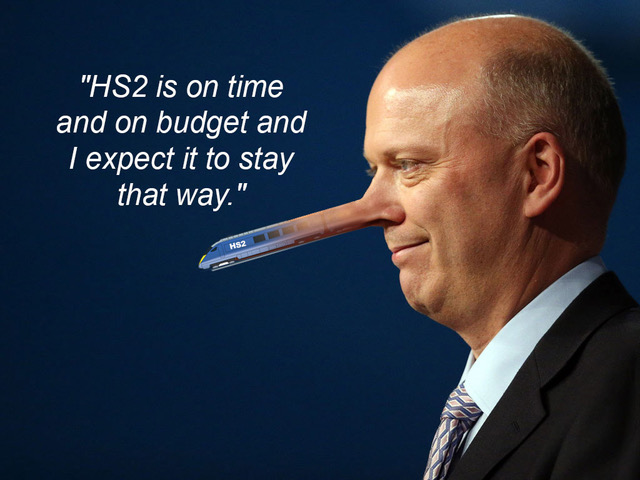
A similar question would be what do you think HS2 Minister Nus Ghani and Permanent Secretary to the DfT Bernadette Kelly did, when they appeared in Parliament and were questioned over the cost of the project? Do you think that they told Parliament and its committees the truth, upholding the Ministerial and Civil Service Codes, the Nolan Principles for Standards in Public Life, and this little thing you may have heard of called “The Law”?
Or not?
Well what they did was whenever anyone asked them about the costs, knowing full well what the questioner meant, they just said that the budget was £55.7bn, thinking this was just such an excellent wheeze, as it was not technically lying.
This was actually one of the reasons for that previously mentioned Sunday Telegraph article. It was clear in 2018 that HS2 was behind schedule and billions over budget, and that a decision had been taken that even though they knew HS” could not be delivered on budget, until they decided to officially change it, they would say this disingenuous rubbish like “We aim to get it in on budget” and “The budget is £55.7bn”, even if they knew it was unachievable, as there would be no way to prove otherwise until they admitted it. With the timescales it was a different matter. The original work schedule had been published in 2013, and it was self-evident that work which had been timetabled to have finished hadn’t even started. Even the HS2 Ltd website backed this up. But as I said, the response to saying that HS2 Ltd were years behind the timetable published by HS2 Ltd, was for HS2 Ltd to claim this was “wrong and misleading”. And tells you everything you need to know about the bunker mentality within HS2 Ltd and the fact they operated – and still operate – like they can get away with anything. The sad thing is, they’re right.
So obviously, when Bernadette Kelly was asked by the Public Accounts Committee on two separate occasions in 2018 and 2019 if HS2 would come in on cost, she just said the budget was £55.7bn, knowing HS2 could not be delivered for that budget. Nus Ghani did the same, but worse. In a Westminster Hall debate on 10th July 2019, the brazen minister who had earlier in the debate taken her time to look at me and smirk (that really did actually happen), said “The business case is clearly solid: there is one budget and one timetable—HS2 will continue on track. My right hon. Friend the Member for South Northamptonshire asked me to confirm at the Dispatch Box what the budget and the timetable are. I stand here to state confidently that the budget is £55.7 billion and that the timetable is 2026 and 2033*.” (*Phase 1 & 2a 2026, Phase 2b 2033).
When I said worse, that wasn’t it. The ‘worse’ was a couple of days later on the 15th of July 2019 when Ghani had ministerial responsibility during the third reading of the Phase 2a bill for HS2. Just to be absolutely clear, this was a time when MPs were very specifically being asked to vote to approve spending more money on HS2. So surely at a time like that, you have to be honest about what those known costs are expected to be? Especially when you are specifically and repeatedly asked that question? Well, no. During the debate, Ghani was questioned on HS2 costs about 20 times, but failed to inform MP’s of the increase, instead saying things like:
- “I can confirm for my hon. Friend and others that there is only one budget for HS2, and it is £55.7 billion. The bit we are talking about today, phase 2a, is £3.5 billion. The benefit-cost ratio is £2.30 for every £1 spent.”
- “My hon. Friend once again challenged the budget. As I said, it is £55.7 billion. It is the job not only of the Department but of the chairman and the CEO to keep budgets tight.”
- “My right hon. Friend has raised the important issue of transparency and the need for data to be up to date. Members of Parliament who are working hard for their constituents need to know exactly what data they are speaking about.”
The contribution of William Wragg MP inadvertently highlighted exactly the reason for this deliberate deception, commenting that “Unlike my hon. Friend, I have in the past supported measures related to HS2, but this evening I shall no longer be doing so, because the escalating cost estimates and the lack of apparent accountability for those increases is now quite frankly ridiculous. Does she agree that a fraction of this amount could be much better spent on improving connectivity within the north of England, rather than wasted on this vanity train set?”
In line with what he said, until this point, the Labour Party had officially supported every single parliamentary vote on HS2. On this occasion, after failing in an amendment aimed at ensuring more accountability for the project, Labour told their MPs to abstain, meaning only 263 MPs voted for the Bill. We will never know what would have happened if Ghani had told the truth, but what we do know is she was asked about the costs of HS2 about 20 times during a debate that lead to a vote on approving spending on HS2, and not one time did she say what she knew to be the truth about what was at that time ‘only’ a £7bn overspend. And that’s apparently all fine.
So let’s just remind ourselves of Section 4 of that 2006 Fraud Act again.
- A person who occupies a position in which they are expected to safeguard, or not to act against, the financial interests of another person. So; Minister, tick; Head civil servant in a Government department, tick; highest paid public servant in the country, tick; chair of HS2 specifically brought in with that remit, tick.
- Dishonestly abuses that position, and intends, by means of the abuse of that position to make a gain for themselves or another. The budget was £55.7bn, and they kept quiet about the fact they knew it was over, while it was going through Parliament. So that’s tens of billions of ticks headed for the construction firms.
- A person may be regarded as having abused his position even though his conduct consisted of an omission rather than an act. Well, that’s your “We weren’t technically lying” excuse right out of the window. All necessary boxes ticked.
But as far as the judiciary is concerned, well if Parliament has been deliberately deceived and Ministers and Civil Servants have been involved in a conspiracy to commit fraud by abuse of position as clearly defined by Section 4 of the 2006 Fraud Act – well, that’s parliaments problem.
No. That is everyone’s problem.

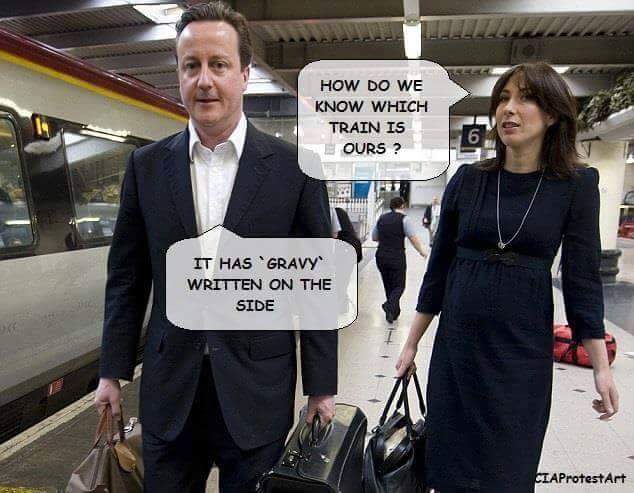

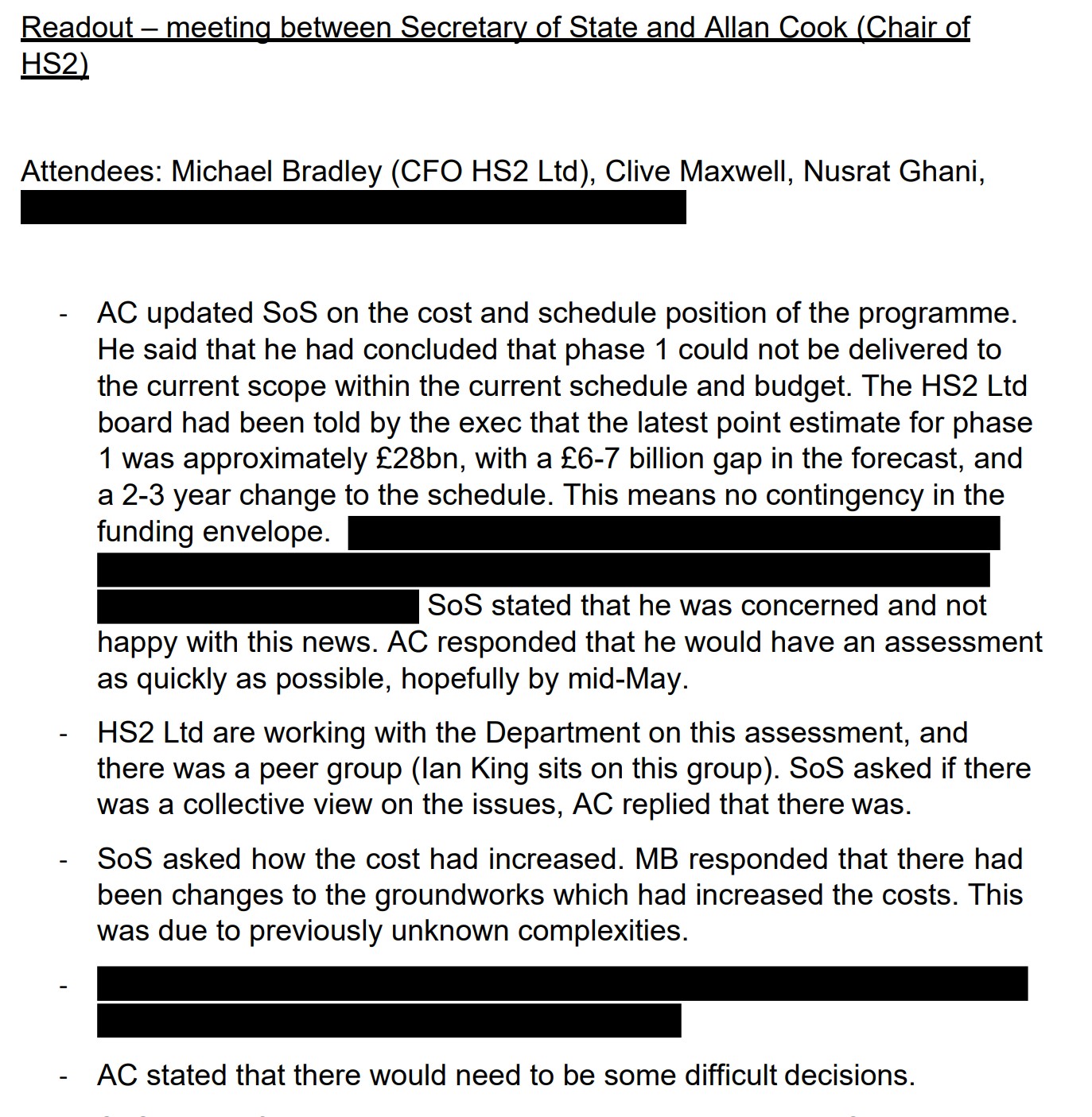
Thank you for trying to stop the Destruction and exposing the endless Lies.
This is not what Train Travel should be about.